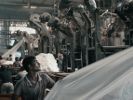Eye For Film >> Movies >> Machines (2016) Film Review
Machines
Reviewed by: Jennie Kermode

In recent years, documentaries like Andrew Morgan's The True Cost have helped to increase awareness in prosperous countries of the conditions facing third world fabric and garment manufacturers, but it's one thing to tour the places where such people work, with narration which - whilst it aims to trouble - is structurally reassuring. It's another to be immersed in such a place, experiencing it only though the people who are there every day. Director Rahul Jain, whose grandfather once owned a factory, travelled to Gujarat to see one for himself. Whilst he neither appears nor speaks in the film (which has no narration), his camera allows him to share his observations with the world.
The first thing we notice is the darkness. Although bright light glares outside the windows, the factory is like the interior of a cave. Heavy slabs of metal gleam in the shadows. The walls are stained with browns, greys, hints of indigo. Steam billows through the air. Jain has aid that he wanted to capture an overwhelming stench of ammonia. He certainly succeeds in showing us that this is somewhere suffocating. The men working there are soaked in sweat. There is dirt everywhere but somehow they keep their hands clean; they cannot get dirt on the merchandise.

It is fabric that is produced here, washed, stretched, dyed and dried. We see it drawn through giant presses, pulled out of tumblers by youths who climb inside them, carried around in huge wet bales. Lifted up before being folded, it reveals its beauty, its ethereal softness, its bright floral patterns - qualities that seem utterly at odds with this environment. One imagines it swirling round the bodies of dancers working in the state's burgeoning film industry. Cinema is one of the few escapes available to workers whose lengthy shifts only earn them around £80 per month. They chew tobacco because they can't afford cigarettes and need something to keep them awake. One thinks of the one in 20 who will develop mouth cancer this way, but given the pollution with which they're surrounded, that may be the least of their worries.
"I work, I go home, I eat, I sleep and then I go to work again," says one of the men, explaining his life. Yet he insists that he is not being exploited. Like numerous others, he has travelled here to work; he had to take out a loan to buy the ticket. His wage, meagre though it is, is much higher than he could hope to earn at home. The extra money will help to give his children an education. Like billions of impoverished people the world over, he dreams not for himself but for the next generation - perhaps, due to his sacrifices, their lives will be better. Meanwhile, a teenager explains to us that it's better to start factory work young than waste time with school. That way one can learn the machines more effectively and progress to a better, less strenuous role.
The film's title may not only refer to the tumblers and the presses; what we see is a reminder that the industrial revolution was also built around an altered perspective on human beings. If anything, they are less valued than the metal machines because they are so easy to replace. There are always more desperate migrants. Those who suffer injury cannot afford to bring cases against the factory owners. Workers explain how attempts at unionisation repeatedly fail because the leaders are identified and killed. There is talk of police corruption and a real sense of hopelessness, though anger remains.
Mingled with these brief interviews and observations of factory work are occasional sequences of bleak yet dazzling beauty as Jain draws his camera back to explore the landscape and provide context. Their contrast with the factory scenes reminds us that the workers are fully aware of the world beyond, not inured to the ugliness of their situation. Though it spends long stretches simply observing, Machines gives its subjects their own voice.
Reviewed on: 06 Aug 2017
















